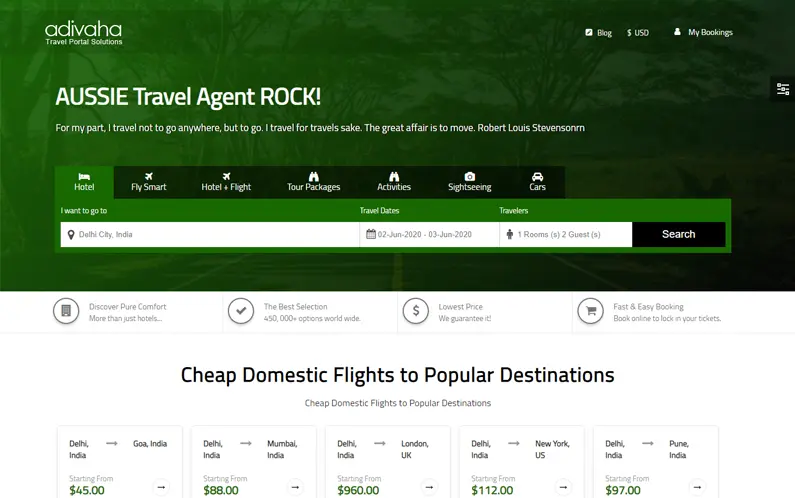Ready to go-LIVE travel solutions that helps your travel agency to sell a range of travel services pretty instantly. adivaha® travel solutions make sure you have no boundation over your imagination, you can do everything online, without the need for any technical knowledge or design skills. Easy Backoffice, extensive reporting with integrated Funds Management System. Upload funds easily and instantly through Netbanking, Debit Card, Credit Card. The best part is, we do offer customizations in case you believe it will boost your business!
How to Easily Integrate Your App with a Flight Search API
Discover the seamless path to integrating a Flight Search API into your app effortlessly. Our comprehensive guide walks you through step-by-step processes, offering insights and expert tips for a smooth and efficient integration experience.
Integrating a Flight Search API into your travel app can revolutionize the user experience and open doors to a vast array of travel options. However, the process might seem complex at first glance. This comprehensive guide aims to break down the steps, offering insights and tips for easy integration.
What are the key steps involved in integrating a Flight Search API into an app?
When integrating a Flight Search API into your app, the process involves several key steps to ensure a seamless experience for your users:
Assessment and Planning: Understand your app's specific needs and objectives. This initial phase sets the foundation for successful integration, aligning the API's functionalities with your app's goals.
API Selection: Choose a Flight Search API that aligns with your app's requirements. Adivaha emphasizes the importance of selecting an API that offers comprehensive data, scalability, and the necessary features crucial for enhancing user experience.
Obtaining Access and Documentation: Gain access to the API and acquire the required credentials. Thoroughly review the API documentation provided by the provider to comprehend endpoints, data structures, and integration protocols.
Development and Integration: Implement the API into your app by following the integration guidelines and utilizing the provided code snippets. Adivaha's team often assists in this phase, ensuring a smooth integration process and addressing any technical challenges.
 Integrating Your App with a Flight Search API
Integrating Your App with a Flight Search API Testing and Quality Assurance: Rigorously test the integrated API to identify and resolve any bugs or discrepancies. Adivaha emphasizes the significance of comprehensive testing to guarantee a flawless user experience.
Optimization and Customization: Utilize the API's features to optimize and customize your app's user interface and functionality. Adivaha encourages leveraging the API's capabilities to create a personalized and efficient travel-search experience.
Maintenance and Updates: Continuously monitor the integrated API for performance and security. Regularly update the integration to incorporate new features or enhancements provided by the Flight Search API provider.
Are there specific tools or platforms that simplify the integration process?
When it comes to simplifying the integration process for Flight Search APIs into apps, several tools and platforms are available, aimed at streamlining and easing the integration journey:
● Integration Middleware: Middleware solutions serve as connectors between different systems, acting as a bridge for seamless communication. They often come with pre-built connectors specifically designed to link various APIs, reducing the complexity of integrating multiple systems. Middleware simplifies data exchange and communication protocols, making integration smoother and faster.
● API Integration Platforms: These platforms offer a centralized hub for managing APIs. They provide a unified interface where developers can access documentation, generate API keys, test functionalities in sandbox environments, and monitor API performance. Integration platforms streamline the integration process by offering a consolidated space for managing different APIs, reducing the time and effort required to integrate each one separately.
● SDKs (Software Development Kits): SDKs provided by API vendors contain libraries, tools, and documentation that assist developers in integrating the API into their applications. SDKs often include code samples, predefined functions, and wrappers that abstract the complexity of API calls, making integration faster and more straightforward. They're particularly useful for developers by providing ready-to-use components and simplifying the learning curve for new APIs.
● API Management Tools: These tools focus on the management aspects of integrated APIs. They offer functionalities such as version control, security management, rate limiting, analytics, and monitoring. API management tools simplify the ongoing maintenance and optimization of integrated APIs, ensuring their security, performance, and compliance with usage policies.
● Code Generators and Templates: Some platforms offer code generators or templates tailored for specific APIs. These resources provide pre-written code snippets or templates that developers can use as a starting point for integration. Code generators accelerate the integration process by automating repetitive tasks and providing standardized code structures.
How can one ensure compatibility between the app and the Flight Search API?
Ensuring compatibility between your app and the Flight Search API is crucial for a seamless integration process. Here’s how you can achieve compatibility:
1. Thoroughly Review API Documentation: Start by understanding the API's documentation provided by the API provider. This documentation outlines the endpoints, data formats, authentication methods, and supported functionalities. Ensure that your app's requirements align with what the API offers.
2. Assess Data Mapping and Formats: Check if the data structures used by the API match the data formats used within your app. Ensure compatibility in terms of data types, structures, and the way information is exchanged between your app and the API.
3. Evaluate Technical Requirements: Assess the technical prerequisites of the API, such as programming languages, protocols, and communication methods. Ensure that your app’s technology stack is compatible with these requirements to facilitate smooth communication and data exchange.
4. Test API Endpoints and Responses: Utilize sandbox or testing environments provided by the API provider to simulate interactions between your app and the API. Test various endpoints, input different parameters, and analyze the responses to ensure they align with your app’s expected behavior.
5. Handle Errors and Exceptions: Understand the error-handling mechanisms of the API. Ensure your app can gracefully handle errors, exceptions, and edge cases that may occur during API interactions to prevent disruptions in user experience.
6. Stay Updated with API Changes: APIs undergo updates and version changes. Stay informed about any modifications or deprecations in the API. Regularly review the API provider's documentation and announcements to adapt your app accordingly.
7. Engage in Effective Communication: Establish a channel of communication with the API provider's support or technical team. This can be beneficial in clarifying doubts, seeking guidance, or addressing compatibility issues promptly.
What challenges might arise during the integration, and how can they be overcome?
Integration of a Flight Search API into an app can present various challenges. Here are some common hurdles and ways to overcome them:
Authentication and Access: Challenges might arise in obtaining and managing API keys, authentication tokens, or credentials required to access the API. This can be tackled by thoroughly following the API provider's documentation and ensuring proper handling of authentication mechanisms within your app.
Data Mapping and Formats: Incompatibility between data structures or formats used by the API and your app can lead to integration issues. To overcome this, perform extensive data mapping exercises, ensuring alignment between your app's data model and that of the API. Data transformation tools or middleware can help bridge these gaps.
Rate Limiting and Quotas: APIs often have rate limits or usage quotas, which, if exceeded, can disrupt functionality. Mitigate this challenge by implementing rate limit monitoring and optimizing API calls within your app to stay within the specified limits.
Error Handling and Exception Management: Handling errors and exceptions that occur during API interactions is crucial. Develop robust error-handling mechanisms within your app to gracefully manage unexpected responses, network issues, or API downtimes.
Version Changes and Updates: APIs evolve over time, introducing new versions or deprecating older ones. Stay updated with API changes, regularly review documentation, and proactively update your app to adapt to these modifications.
Performance and Latency: Integration might encounter performance issues or latency due to network delays or inefficient data retrieval. Optimize API calls, implement caching mechanisms, and utilize asynchronous processing to enhance performance and responsiveness.
Testing and Quality Assurance: Inadequate testing can lead to undetected bugs or inconsistencies in the integrated system. Conduct rigorous testing in different environments, simulate various scenarios, and perform regression testing to ensure the integration works seamlessly.
At Adivaha, our team is adept at navigating these challenges during API integrations. We employ robust strategies, thorough testing procedures, and proactive measures to overcome integration hurdles, ensuring a smooth and reliable integration of Flight Search APIs into travel apps, ultimately delivering exceptional user experiences.
How does the integration process vary for different types of travel-related apps or services?
The integration process for different types of travel-related apps or services can vary based on their specific functionalities, target audience, and the extent of travel-related services they offer. Here's a breakdown:
These apps primarily focus on flight-related services. Integration involves incorporating Flight Search APIs to provide real-time flight information, booking capabilities, seat availability, pricing, and itinerary details. Emphasis is on a seamless booking experience and robust payment gateways.
For hotel booking apps, integration includes Hotel Search APIs to access information about available rooms, prices, amenities, and booking functionalities. APIs also facilitate reviews, images, and location details for a comprehensive hotel search experience.
Aggregator apps integrate multiple APIs, including flights, hotels, car rentals, activities, and more. Integration complexity increases as these apps combine various APIs to offer a comprehensive travel solution, requiring effective management of multiple data sources and diverse functionalities.
Apps offering travel recommendations, guides, or itineraries integrate APIs providing information about attractions, local events, restaurants, and transportation options. Integration focuses on delivering curated and personalized recommendations to users.
These apps integrate APIs for tracking expenses, managing itineraries, and providing budgeting tools. Integration includes accessing financial APIs for transactions, travel-related expense data, and itinerary management functionalities.
Integration involves connecting with APIs specialized in corporate travel services. This includes managing employee travel bookings, expense reporting, compliance with company policies, and integration with corporate payment systems.
At Adivaha, we recognize the transformative potential of integrating Flight Search APIs and the significance of a meticulous approach. Our expertise lies in guiding you through this integration process, leveraging innovative solutions and our experience in the travel industry to empower your app with enhanced functionalities and a truly immersive travel experience for your users. Embrace the integration journey—it's your gateway to elevating your app's capabilities and delighting your audience in the dynamic world of travel.
Keep Refreshing your customers - Who doesn't want his site to stand out from crowd? adivaha® gives you multiple options for home pages, headers, colors etc. Which can easily be managed from admin via shortcodes and settings. The theme supports almost all the big players in this market ie, WEGO, Travelpayouts, Agoda, Booking, Expedia etc.












